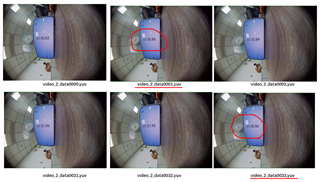Tool/software:
Hi TI:
We are using am62p5 with SDK10.0. There are 4 cameras. The schematic diagram of the MIPI data stream is as follows:

We simultaneously open 4 device nodes(/dev/video2~5) and save continuous frame data. We found that frame data obtained from the same camera may be duplicated.
For example, we saved 34 consecutive frames of images from the /dev/video2 node (video_2_data0000. yuv to video_2_data0033. yuv), the Video_2_data0001.yuv and video_2_data0033.yuv are the same image.

The attach file is the source code that we are using for test.
#include <sys/types.h>
#include <sys/stat.h>
#include <fcntl.h>
#include <sys/ioctl.h>
#include <unistd.h>
#include <stdio.h>
#include <string.h>
#include <linux/types.h> /* for videodev2.h */
#include <linux/videodev2.h>
#include <poll.h>
#include <sys/mman.h>
#include <stdlib.h>
char *videodev[4];
int main(int argc, char **argv)
{
int fd[4];
struct v4l2_fmtdesc fmtdesc;
struct v4l2_frmsizeenum fsenum;
int fmt_index = 0;
int frame_index = 0;
int i;
void *bufs[4][32];
int buf_cnt;
int type = V4L2_BUF_TYPE_VIDEO_CAPTURE;
struct pollfd fds[4];
char filename[32];
int file_cnt[4] = {0,0,0,0};
int ret;
videodev[0] = "/dev/video2";
videodev[1] = "/dev/video3";
videodev[2] = "/dev/video4";
videodev[3] = "/dev/video5";
int k;
for (k = 0; k < 4; k++) {
/* open */
fd[k] = open(videodev[k], O_RDWR);
if ( fd[k] < 0) {
printf("can not open %s\n", videodev[k]);
return -1;
}
printf("open %s ok\n", videodev[k]);
struct v4l2_capability cap;
memset(&cap, 0, sizeof(struct v4l2_capability));
struct v4l2_format fmt;
memset(&fmt, 0, sizeof(struct v4l2_format));
fmt.type = V4L2_BUF_TYPE_VIDEO_CAPTURE;
fmt.fmt.pix.width = 1280;
fmt.fmt.pix.height = 964;
fmt.fmt.pix.pixelformat = V4L2_PIX_FMT_UYVY;
fmt.fmt.pix.field = V4L2_FIELD_ANY;
if (0 == ioctl(fd[k], VIDIOC_S_FMT, &fmt))
{
printf("%s, set format ok: %d x %d\n",videodev[k], fmt.fmt.pix.width, fmt.fmt.pix.height);
}
else
{
printf("%s,can not set format\n",videodev[k]);
return -1;
}
struct v4l2_requestbuffers rb;
memset(&rb, 0, sizeof(struct v4l2_requestbuffers));
rb.count = 32;
rb.type = V4L2_BUF_TYPE_VIDEO_CAPTURE;
rb.memory = V4L2_MEMORY_MMAP;
if (0 == ioctl(fd[k], VIDIOC_REQBUFS, &rb))
{
buf_cnt = rb.count;
for(i = 0; i < rb.count; i++) {
struct v4l2_buffer buf;
memset(&buf, 0, sizeof(struct v4l2_buffer));
buf.index = i;
buf.type = V4L2_BUF_TYPE_VIDEO_CAPTURE;
buf.memory = V4L2_MEMORY_MMAP;
if (0 == ioctl(fd[k], VIDIOC_QUERYBUF, &buf))
{
/* mmap */
bufs[k][i] = mmap(0 /* start anywhere */ ,
buf.length, PROT_READ | PROT_WRITE, MAP_SHARED, fd[k],
buf.m.offset);
if(bufs[k][i] == MAP_FAILED) {
perror("Unable to map buffer");
return -1;
}
}
else
{
printf("can not query buffer\n");
return -1;
}
}
printf("map %d buffers ok\n", buf_cnt);
}
else
{
printf("can not request buffers\n");
return -1;
}
for(i = 0; i < buf_cnt; ++i) {
struct v4l2_buffer buf;
memset(&buf, 0, sizeof(struct v4l2_buffer));
buf.index = i;
buf.type = V4L2_BUF_TYPE_VIDEO_CAPTURE;
buf.memory = V4L2_MEMORY_MMAP;
if (0 != ioctl(fd[k], VIDIOC_QBUF, &buf))
{
perror(" Unable to queue buffer");
return -1;
}
}
printf("queue buffers ok\n");
if (0 != ioctl(fd[k], VIDIOC_STREAMON, &type))
{
perror("Unable to start capture");
return -1;
}
printf("start capture ok\n");
}
while (1)
{
struct v4l2_buffer buf;
/* poll */
memset(fds, 0, sizeof(fds));
fds[0].fd = fd[0];
fds[0].events = POLLIN;
fds[1].fd = fd[1];
fds[1].events = POLLIN;
fds[2].fd = fd[2];
fds[2].events = POLLIN;
fds[3].fd = fd[3];
fds[3].events = POLLIN;
ret = poll(fds, 4, -1);
if (ret > 0) {
for (k = 0; k <4; k++) {
if (fds[k].revents & POLLIN){
memset(&buf, 0, sizeof(struct v4l2_buffer));
buf.type = V4L2_BUF_TYPE_VIDEO_CAPTURE;
buf.memory = V4L2_MEMORY_MMAP;
if (0 != ioctl(fds[k].fd, VIDIOC_DQBUF, &buf)) {
perror("Unable to dequeue buffer");
return -1;
}
/* save frame data */
{
sprintf(filename, "/tmp/video_%d_data%04d.yuv", k+2, file_cnt[k]);
int fd_file = open(filename, O_RDWR | O_CREAT, 0666);
if (fd_file < 0) {
printf("can not create file : %s\n", filename);
}
write(fd_file, bufs[k][buf.index], buf.bytesused);
close(fd_file);
}
file_cnt[k]++;
if (0 != ioctl(fds[k].fd, VIDIOC_QBUF, &buf))
{
perror("Unable to queue buffer");
return -1;
}
}
}
}
}
return 0;
}
Please help us to analyze the issue.
Thanks
Zehai Wu

